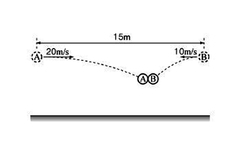Perfectly inelastic collision
 In the above figure, two objects
and
with the same mass
are
m away from each other. Now,
and
are thrown horizontally at the same time at the velocities
m/s and
m/s, respectively, eventually colliding with each other in the air. If the two objects stick together after a perfectly inelastic collision, what is the speed of the mass at the moment of collision (in m/s)?
In the above figure, two objects
and
with the same mass
are
m away from each other. Now,
and
are thrown horizontally at the same time at the velocities
m/s and
m/s, respectively, eventually colliding with each other in the air. If the two objects stick together after a perfectly inelastic collision, what is the speed of the mass at the moment of collision (in m/s)?
Assume that gravitational acceleration is m/s .
This section requires Javascript.
You are seeing this because something didn't load right. We suggest you, (a) try
refreshing the page, (b) enabling javascript if it is disabled on your browser and,
finally, (c)
loading the
non-javascript version of this page
. We're sorry about the hassle.
applying conservation of momentum in both horizontal and vertical direction ...as hori. vel. doesn't changes so vel. of combined mass will be (m 20-m 10)/2m= 5 and for vert. velo. fst we have to calculate time which is 0.5 sec as per eqn. (20 t+10 t)=15,, now vert. vel. of both mass =g*t=5 ,,,so applying the very fst equation again we get vel. vert. of combined mass =5.. hence total mass is sqrt of (5.^2+5.^2)= 5root2...answer